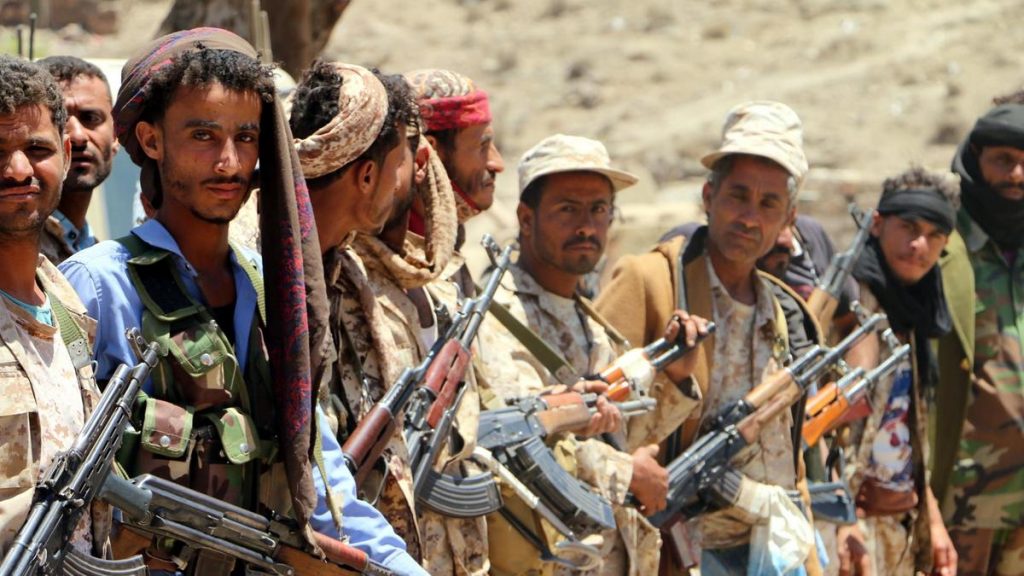
The Houthi commander leading the Yemeni rebels’ assault in Dhalea was killed as pro-government forces recaptured large areas of the southern province, military officials said according to thenational.ae.
Yehya Al Rezami was among 80 Houthi fighters killed on Wednesday, Col Ahmed Qaid, commander of the Security Belt Forces in the province, told The National. Twelve others surrendered.
Al Rezami was from the Houthi stronghold of Saada province in northern Yemen and was killed in the Abara area on the Hajer front, said Col Qaid, whose troops are part of a pro-government alliance known as the Southern Joint Forces.
“Our forces drove the Houthi rebels from several key sites north of Qatabah and on the Hajer front west of the city,” he said. “We retook Kardah village, Al Wa’el mountain and all the hills around it, the village of Homar Al Sadah and the special forces military base in Qatabah, Al Kawz village and Al Karna’a area north of Qatabah. On the Hajer front our forces along with the other southern divisions liberated 90 per cent of Al Abara area and Bajah village.”
The Southern Joint Forces are now focused on pushing the rebels out of the northern parts of Dhalea such as Damet, Al Hasha and Al Aoud after recapturing Qatabah city last week, said Capt Majed Al Shoaibi, who was recently appointed spokesman for the Southern Joint Forces in the area.
“This was the second push after recapturing Qatabah last Friday. Now a strategic military base is going to be set up in Qatabah to act as a central command for military operations against the Houthis,” Capt Al Shoaibi told The National.
The Houthis retaliated to their losses on Wednesday by firing mortars and Katyusha rockets at populated areas. More than 15 rockets fell in the Khoura area in Hajer, residents told The National, destroying several homes and forcing people to flee. A 10-year-old was reported killed in Shab Al Osood village when a Houthi shell landed near the family’s home.
The Arab military coalition supporting the government promised more support to the forces in Dhalea when Brigadier Omar Al Tunaiji, the coalition’s western commander, met representatives of the Southern Joint Forces earlier this week.
“Brigadier Al Tunaiji heard the details of military developments and assured the forces’ representatives that the coalition stands ready to provide all needed support and had ordered reinforcements from the Amalikah Brigades to boost the fronts in Dhalea,” the spokesman of the Joint Forces on the western coast, Col Wathah Al Dubaish, told The National.
Meanwhile, residents of Hodeidah say the rebels are continuing to reinforce positions in the western port city despite apparently complying with a ceasefire agreement by pulling out of the three main ports last week under UN supervision.
Col Al Dubaish told The National the government was going to stop participating in the committee overseeing the implementation of the ceasefire unless the UN included its representatives in the monitoring of the rebels’ unilateral withdrawal.
The head of the UN observer mission, Gen Michael Lollesgaard, said the Houthis had withdrawn from Hodeidah, Ras Isa and Al Saleef ports but the government says the pullout was not jointly monitored by its representatives as agreed and accused the rebels of staging a deception.
“The Houthi unilateral withdrawal means nothing for us and we are going to stop dealing with Gen Lollesgaard because he violated all the points agreed with the government team on May 13 in Aden and went to legitimise the Houthi unilateral withdrawal, ignoring us and our requests,” Col Al Dubaish said
Residents of Hodeidah said the Houthis continued entrenching their positions at many places in the city last week.
“Earlier this week seven Ethiopians hired by the Houthis were killed in a landmine explosion in Al Saleh city as they were digging a new tunnel,” a resident told The National.
The long-delayed Hodeidah ceasefire requires both sides to pull their forces out of the city, which is the main entry point for Yemen’s food imports and humanitarian aid.


